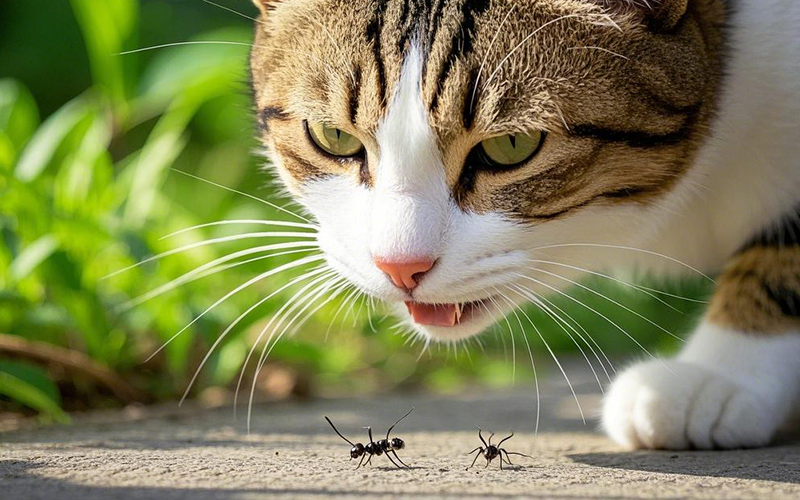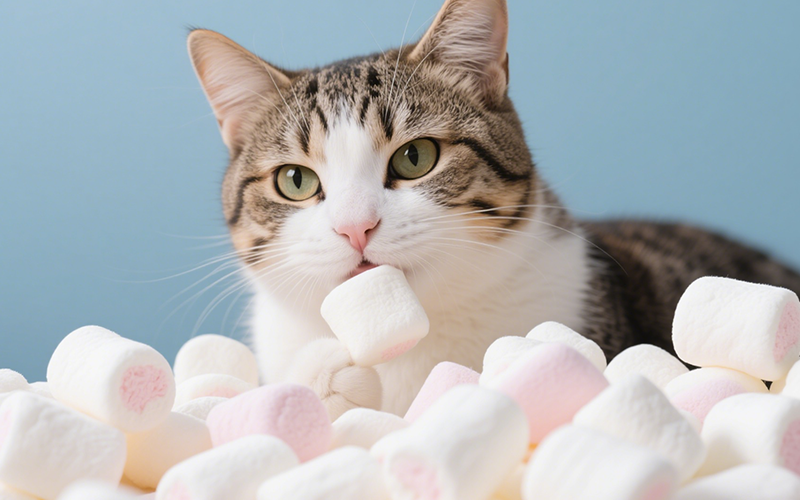Can Cats Eat Ants? What You Need to Know About Your Cat’s Ant Encounter
- 20 Mar 2025 10:01
As a curious cat owner, you may have caught your feline friend in the act of stalking and pouncing on a few ants 🐜. It’s natural to wonder if it's safe for your cat to eat ants or if these tiny creatures pose any risks. After all, cats are natural hunters, and it’s not uncommon for them to chase and nibble on bugs. 😸
Let’s dive into whether it’s safe for cats to eat ants and what you should keep in mind if your cat decides to snack on these little critters.

Are Ants Safe for Cats to Eat?
The short answer is that most ants are not harmful to cats, but there are some important things to consider. 🌱
In general, ants are not toxic to cats. They are small, low-calorie creatures, and eating a few ants here and there is unlikely to cause any serious harm. However, there are a few potential concerns when it comes to ants and your cat:
Pesticides and Chemicals: One of the biggest risks associated with ants is if they have been exposed to pesticides or other chemicals. If your cat eats ants that have been in contact with such substances, it could be exposed to harmful toxins. 🐾
Ant Bites: While ants themselves are typically not dangerous, certain species, like fire ants, can bite and sting. This can cause irritation, swelling, or an allergic reaction in your cat. ⚠️
Choking Hazard: Although rare, if your cat tries to eat a large number of ants at once, there’s a small risk of choking, especially if the ants are not chewed properly.
What to Do if Your Cat Eats Ants
If your cat eats an occasional ant or two, there’s usually no need to worry. However, if you notice your cat eating a large number of ants or experiencing any negative symptoms, here’s what you should do:
Observe for Signs of Illness: If your cat shows any signs of discomfort, such as drooling, vomiting, or difficulty breathing, especially after eating ants, it could be due to pesticide exposure or an allergic reaction to an ant bite. If this happens, contact a pet health professional immediately. 🚑
Check for Ant Bites or Stings: If your cat starts to scratch or lick an area after eating ants, check to see if there’s any swelling or redness. If your cat has been bitten or stung by fire ants, it might need treatment for the reaction.
Prevent Future Ant Encounters: If you notice ants in your home, try to clean up any food or crumbs that might attract them, and consider using safe, pet-friendly methods to keep ants away. Avoid using harmful chemicals around your cat.
Signs of an Allergic Reaction to Ant Bites
Some cats may be allergic to ant stings or bites, especially if they’re exposed to fire ants. Watch for these symptoms:
Swelling or redness around the mouth, paws, or other areas
Excessive licking or scratching at the affected area
Difficulty breathing or drooling
Vomiting or diarrhea
If your cat experiences any of these symptoms, seek immediate assistance from a trusted pet health resource. 🐾
How to Keep Your Cat Safe from Ants
While the occasional ant snack is unlikely to cause harm, it's still a good idea to keep your cat away from ants. Here’s how to do that:
Keep Food Areas Clean: Ants are often attracted to food crumbs, so keep your cat’s feeding area clean and free from scraps.
Use Natural Ant Deterrents: There are many pet-safe ways to keep ants out of your home, such as using cinnamon or vinegar near entry points where ants are coming in.
Monitor Your Cat’s Behavior: If your cat is consistently hunting ants, you may want to distract them with toys or playtime to keep them engaged and away from the insects.
How PettureX Can Help Keep Your Cat Safe
It’s always important to stay informed about what’s safe for your cat, especially when it comes to potential threats like ants. If you're ever uncertain about what your cat is eating or if they show signs of illness after a run-in with ants, PettureX can offer 24-hour online consultation to help you navigate any concerns. 🐱💻
PettureX provides valuable insights and advice about pet health and can offer peace of mind with instant support and pet image recognition. It’s a great tool to help you care for your cat’s well-being and stay ahead of any health issues. 📱
Conclusion
So, can cats eat ants? In moderation, the occasional ant or two is generally safe for your cat. However, be mindful of the potential risks, like pesticide exposure or ant bites, and make sure your cat isn’t eating too many at once. Keep an eye out for any signs of discomfort, and remember that most cats don’t need to eat ants to stay healthy.
For all your pet health questions, PettureX is there to help with real-time guidance and advice. Keep your kitty safe and healthy with the help of this convenient pet assistant! 🐾🌟
Related

Marshmallows and Cats: A Puffy Problem? Why Vets Say No to This Sugary Snack
- 22 Apr 2025
Kefir for Kitties? A Veterinarian-Reviewed Guide to Safety, Benefits & Risks
- 22 Apr 2025
The Burning Question: Can Cats Eat Jalapenos? A Comprehensive Safety Guide
- 21 Apr 2025
Cool Temptation: Can Cats Eat Ice Cream Safely? The Vet-Backed Truth
- 21 Apr 2025
Frankly Dangerous: Can Cats Eat Hot Dogs? Vet Explains the Serious Risks
- 16 Apr 2025
A Purrfect Protein? Can Cats Eat Ground Turkey Safely? (Vet-Reviewed Guide)
- 16 Apr 2025
Gritty Situation: Can Cats Eat Grits Safely? Vet Explains the Risks
- 16 Apr 2025
Gravy Danger Zone: Can Cats Eat Gravy Safely? (Vet-Reviewed Warning)
- 16 Apr 2025
Crunchy Query: Can Cats Eat Green Peppers? A Vet-Reviewed Safety Analysis
- 16 Apr 2025
Toxic Temptation: Can Cats Eat Grapefruit? Vet Explains the Dangers
- 16 Apr 2025
